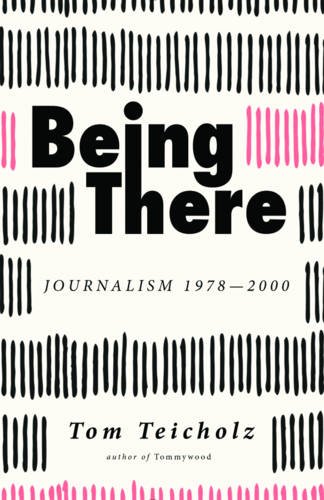Actors refer to being fully available for a part as “showing up.” That means they aren’t just physically present, but emotionally as well. As they allow a character to come into their own skin, other concerns fall away; they have shown up and thus we meet Michael Corleone or Thelma and Louise.
For journalist Tom Teicholz, it was “being there” that sent him down the writing path – but it was also his own background and thoughtful nature that permitted him to fully listen to those he wrote about. As he writes in the introduction to Being There: Journalism 1978-2000, his retrospective of interviews, essays, and book excerpts, “Being there was a case of right place, right time. You couldn’t help but take in the excitement and the cultural ferment.” He’s referring to living in New York from 1978-2000, which permitted him to join the staff at Interview Magazine and thereby interview a range of literary and cultural luminaries such as Jerzy Kosinski, Tom McGuane and Jeff Bridges. It also resulted in attending book and magazine parties where he communed with rising stars such as Richard Ford and Joy Williams, and revered figures including Norman Mailer and James Jones. As he traversed this trail, he also stopped in at CBGB and Max’s Kansas City, where Patti Smith and the Talking Heads and Blondie were frequently appearing, and later, as disco came in, Danceteria and the Palladium. This was all the backbeat – or if David Johansen showed up, the main event – of any given evening.
[alert type=alert-white ]Please consider making a tax-deductible donation now so we can keep publishing strong creative voices.[/alert]
“Journalism was a way in,” Teicholz continues, “to people, places, experiences, as much reason as excuse to always be learning.” The pieces that he wrote at the time “were performances, as much duel as blind date, and although researched, prepared and choreographed, they were always open to improvisation and to the magic that can occur when words and spoken and put to paper.”

This all becomes quite clear across this wide-ranging, witty and insightful collection. Yet it was more than just “being there” that facilitated Tom’s pieces. His own background as a native of Manhattan, child of holocaust survivors, and Columbia-educated lawyer and journalist informed his grounding in the literary life. His passion for intellectual inquiry and desire to bear witness to his family’s story are palpable in various pieces, and because of that, much insight is passed on. For instance, there’s an excerpt from The Trial of John Demanjuk, his excellent and meticulously reported book about the former Nazi who was found living in Cleveland during the 1980s and then extradited to Israel for a trial. It was the first post-Eichmann trial of a Nazi, and as such taught a new generation about what happened to some of their parents.
There is also an interview with Nobel Literature Prize winner Isaac Bashevis Singer, filled with wonderful, unexpected questions. “Do you think life today is more passionate?” Teicholz asks, referring to Singer’s upbringing with a strict, religious father. “I think that in people who restrict themselves,” Singer says, “there is more passion because the passion doesn’t want the restriction. It tries to get out of the restrictions, so there is more of a battle.” Think about that as you watch internal battles among people of many persuasions now playing out on the national stage.
Interestingly, the book includes a telling tidbit in the Paris Review interview with novelist Cynthia Ozick. Teicholz asks her about some author photos on the back of her paperbacks. She points out that she has gotten older. He notes that “when you buy and read a book, you spend a lot of time looking at that picture of the writer. It’s what you have of them.” Ozick says she does the same thing. Yet there’s no picture of Teicholz on the cover of Being There, no entry into the cavalcade of images that come our way every minute, every hour. So what we have are words and ideas “choreographed and improvised,” the height of literary citizenship, a rank that the author fully merits. Fortunately for us, Tom Teicholz was there, amid a moment of intense artistic excitement – and through his observations and commentary, we are too.
